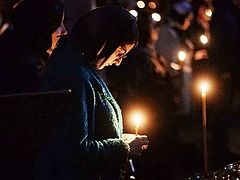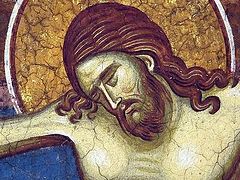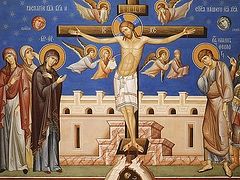Passion Week is a special time when the Church remembers the Lord’s path to Golgotha. There are very significant services taking place in the churches, and it would be good to come and pray at each of them. But how can we combine the modern rhythm of life with our life in Church during the week before Pascha? How can we answer those who do not consider it necessary to attend the services and ascribe to the theory of “God in the soul?” How should we prepare ourselves for Holy Pascha? And in general, how can we combine the religious and the secular in our lives—the spiritual and the daily routine? We posed these questions to Metropolitan Onuphry of Kiev and All Ukraine.
 His Beatitude Onuphry, Metropolitan of Kiev and All Ukaine
His Beatitude Onuphry, Metropolitan of Kiev and All Ukaine
—Your Beatitude, allow me to ask you several questions that we often hear from our friends, acquaintances, and others who view the Church from outside its gates, without participating in its services or participating rarely, only on the great feasts. The most common question is also a justification: Why and how can I spend so much time in church, how does the Church rule require this when I have work, family, and a vegetable garden to attend to, and poor health to boot? After all, before Pascha we need to be in church every day, and then stand through the Paschal services all night. Where are we supposed to get the time and the strength?
—The Lord does not demand of us that we spend all our spare time in church, and the Church in the person of its clergy does not insist upon it. The modern rhythm of man’s life, especially in the cities, is such that he really doesn’t have any spare time. Some people now spend half their day just commuting to work. That is, the workday is seven or eight hours, and three or four hours can be spent just getting there and back. For example, now many travel to Kiev for work from the suburbs and the villages, where there is no work at all. As they tell me, people get jobs as watchmen in the capital city, for example, who live in towns or villages 150–200 kilometers away. They work for a week at some company, and then rest for a week. And what does this “rest” consist of in the village? Work in the vegetable garden and orchards, and taking care of farm animals... That is why it’s no accident that services in the parishes are significantly shorter than those in the monasteries.
But it’s not just a matter of the rhythm of our modern life, which really is often increased to an abnormal pace and tension. It is a matter of our faith, our personal relationship with God, of what is going on in our souls. The Lord does not force anyone to go to His church. He only humbly calls to a person, Come unto me, all ye that labour and are heavy laden, and I will give you rest (Matt. 11:28). In creating man, the Lord gave him an immortal soul. And an immortal soul by its very nature cannot but seek God. Therefore every person wants to discover this source of immortality in himself. When a person begins to turn to God, a need to commune with God arises in him. Therefore the Lord is greatly merciful; He cares for each and every living soul, hears our thoughts, knows our hearts, our feelings, and our worries. He loves each soul without measure and knows every soul better than that person knows himself. Therefore our earthly life and our life and fate beyond the grave depends upon our trust in God. When a young man falls in love with a girl, he doesn’t sleep at night for thinking about her, his heart is filled with love, and he is ready to give everything just to see his beloved, to be near her for even a few moments.
The person who loves God even more that that longs for the Lord, like a deer for a source of water, as the blessed Prophet David sings in the Psalter: Like a hart panteth after the springs of water, so does my soul long for Thee, O God (Ps. 41:2). And if such love is born in a person’s soul for God, he will arrange his life in such a way that he can be closer to Him. Then he will plan his time so that he can be in church, so that he can fast for the sake of the Lord, do good deeds for His sake and love everyone, pray for them and for peace throughout the whole world. Then he will strive to remove all impurity from his soul, so as not to offend the loving Lord with it. After all, nowhere does the Lord say, “Come to Me at the services,” but calls to us: My son, give Me thy heart (Prov. 23:26).
Therefore it is not so important how much time we spend in church—an hour or all night—but how we relate to God, what our relationship is with Him, and how we respond to His call...
—Doesn’t this mean though that one can just not go to the services at all, but “Have God in his soul”, like most non-religious people say everywhere?
If a person was baptized in the Orthodox Church and truly considers himself a believer, he cannot but go to God’s church. Because in God’s church is God’s sacrament of Divine Liturgy—the Lord gives us His Body and Blood for the remission of our sins, and the healing of our souls. After all, a person who says that he has God in his soul might not even guess that his soul is covered with the wounds of sins and all dripping with blood; it is disfigured and corrupted, but that person does not feel it and does not heed to himself to understand that he is seriously ill with sin, and that only the Lord can heal him. A church is a spiritual hospital, and since no one is without sin, which is a spiritual illness, then everyone should go to church.
—Your Beatitude, this begs a question of another order. How should we relate to politicians who are governing whole regions and nations? After all, the Lord gave them that right, because there is no power but of God (Rom. 13:1), as the apostle Paul reminds us.
—All power is from God, but not everyone holding power heeds God, and often they not only do not heed Him, but act against His will and divine laws.
—The politicians of Ukraine have done everything to create a new schismatic religious structure with the name “OCU” [Orthodox Church of Ukraine]. You have already spoken much about on this topic in your sermons and interviews, explaining the nature of the schism and the Constantinople Patriarchate’s participation in it. But nonetheless, at what stage did the high ranking politicians allow a mistake in this matter? After all, it could have been avoided.
—The politicians’ mistake consists in the fact that having received worldly authority from God, they consider that they also received spiritual authority. They are meddling in the sphere of people’s spiritual life, not understanding what this is, and they are trying to correct Church life by using political principles. This is the same as if one where to try to fix a space ship with a hammer and chisel. That is why after their meddling in church affairs the problems do not disappear but multiply instead. All of us to whom the Lord has given power should open the Holy Bible—there it is written how rulers should be and what happens when we commit tyrannical acts.
—The Pascha of the Lord is drawing near, and we are in Passion Week. How can we spend it if we have little free time, about which we spoke at the beginning of our talk?
—Passion Week stands alone in Great Lent; it completes it. Each day of this week is called “Great”. We are walking with the Lord in His final days on earth, beginning with the Entry of the Lord into Jerusalem. Therefore we need to strive to be with Him in these days in both body and soul. In soul, if we re-read the Gospels where these events are described, if we pay attention to the texts of the services in the Lord’s church. In body, if we abstain during these days from idleness, vanity, or overeating; if we bow down before His crucifixion and kneel before His Burial Shroud, when He will be lying in the grave... If we turn to Him heart and soul. And each of us can do all according to the measure of our strength, possibilities, and free time. One might spend a half and hour in church, while another can stand for the entire service, and the Lord blesses each one. After all, there is a reason why St. John Chyrsostom says in his Paschal homily:
“If any have wrought from the first hour, let him today receive his just reward. If any have come at the third hour, let him with thankfulness keep the feast. If any have arrived at the sixth hour, let him have no misgivings; Because he shall in nowise be deprived therefore. If any have delayed until the ninth hour, let him draw near, fearing nothing. And if any have tarried even until the eleventh hour, let him, also, be not alarmed at his tardiness. For the Lord, who is jealous of his honour, will accept the last even as the first. He giveth rest unto him who cometh at the eleventh hour, even as unto him who hath wrought from the first hour.”
May the Lord bless each one who sincerely strives to meet the Pascha of the Lord.




